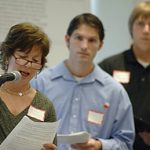Elon faculty, staff and students gathered in McKinnon Hall Sept. 22 for a summit meeting on the academic climate at the university, bringing together the recommendations of seven committees which met during the previous year. Details...
 More than 150 people, including almost 30 students, attended the summit to hear committee reports, generate additional ideas and prioritize the issues most important to maintaining a healthy and vibrant academic program at Elon.
More than 150 people, including almost 30 students, attended the summit to hear committee reports, generate additional ideas and prioritize the issues most important to maintaining a healthy and vibrant academic program at Elon.
Provost Gerald Francis said the summit meeting has the potential to make a real difference, similar to previous initiatives at Elon such as the North Carolina Teaching Fellows and a substantive study of the General Studies program.
“As I was thinking about this session, I think we have another opportunity to make a significant impact on the academic programming here at the institution,” Francis said. “Much, much work has brought us to this venue today.”
Seven committees, each comprised of students, faculty and staff, spent the 2005-06 academic year looking at topics such as defining academic challenge; setting the stage for academic challenge; competition for students’ time outside the classroom, attendance policies and student evaluations of teaching, grading and feedback to students, challenges in experiential education, and course levels and prerequisites.
Laurin Kier, associate director of tutorial services, reported for the committee which examined factors that compete for students’ time away from class. Kier said more than 80 students attended a forum held by the committee, which found that many students “feel more pressure to do things with student organizations than go to class.” Time management is a critical issue for many students to achieve balance between academics, student organizations and other activities.
“Students told us they need help with time management throughout their four years (at Elon),” Kier said, not just their freshman year. Many students are involved in multiple activities outside of class, and the committee recommended that Elon consider developing messages and strategies that help students prioritize their outside activities. The committee envisioned that students might be involved in fewer activities outside of class, but be able to deepen their experience in those activities as a result.
Following the committee reports, small groups of 6 or 8 people each held discussions on the recommendations they felt strongest about, then placed colored dots beside those recommendations on large poster boards at the front of the room.
Seven recommendations developed by committees received the most support.
They included the following:
- Complete the process of developing an institution-wide definition of academic challenge, based on the recommendations provided during the Academic Summit. This definition should incorporate a discussion of the relationship between rigor and challenge and address the different agents of challenge, including at least: students, teaching faculty, and institutional policies.
- Reallocate institutional resources to increase the faculty’s capacity to provide academic challenge. Specific recommendations include: increasing funding for student research; expanding support for faculty research and development; and continuing to invest heavily in library resources.
- Encourage faculty to use diverse and creative pedagogies that stimulate multiple ways of learning, heighten engagement, encourage students to “think outside the box” and seek new solutions for old problems, connect disciplinary knowledge with real world application, and promote lifelong learning.
- The message to students and faculty about the ELR should elevate its profile in the academic program, be more clear and purposeful, and define the steps for completion. It should show how the ELR and the Elon Experiences are related and make clear the academic and general studies links. Students should be encouraged, if not required, to participate in additional ELRs. The EEOC should consider requiring students to apply for an experience to count as an ELR.
- Faculty who supervise/teach experiences that carry ELR credit should examine carefully the preparation component(s) of the experience and, if necessary, devise mechanisms to engage students fully in this important part of the process. The Experiential Education Oversight Committee should examine the possibility of creating a dedicated time for such in the weekly calendar in which no other classes or meetings are scheduled.
- Require departments to define academic rigor as it is understood in their discipline. This definition could be based on, perhaps, national disciplinary guidelines, acceptance into graduate programs in the discipline, etc. Each department should demonstrate how new courses proposed comply with those definitions of academic rigor. Once academic rigor/challenge is defined, the Curriculum Committee, should have a role in evaluating academic challenge/rigor in new courses and programs.
- Evaluate messages sent to students about involvement in co-curricular activities and clarify messages regarding co-curricular involvement vs. students’ academic course-load and rigor.
Other recommendations developed at the summit that received the most support included the following:
- Investigate ways to challenge ourselves as well as our students for scholarship and research.
- Establish a presidential task force on faculty scholarship, research and development.
- Reconsider the amount of time allowed for adding and dropping courses.
- De-emphasize social communities that compete for student time and encourage high-risk behavior.
- Consider 19 hours as a full academic load.
- Investigate how the use of alcohol affects student academic performance and middle-of-the-road students.
- Explore ways for departments to recruit and retain diverse faculty.
Mary Wise, assistant vice president for academic affairs, said the recommendations will be compiled and presented to students and faculty for consideration. She was pleased with the attendance and the discussion.
“People came after classes on a Friday, and I was thrilled with the number of students,” Wise said. “It was a community effort. It wasn’t just a little subset of the community, but very representative of the campus. This is who we are and what we do best.”


